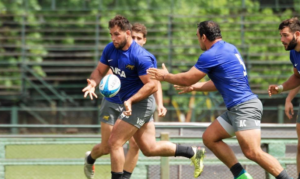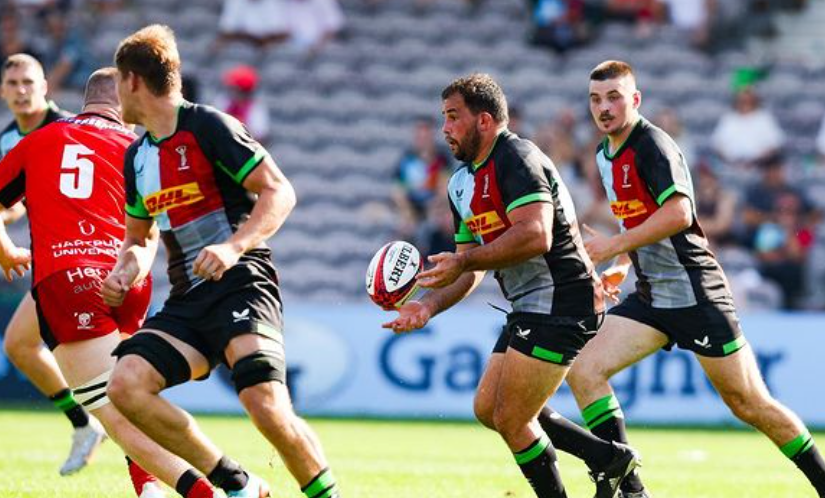Santiago Garcia Botta is a former professional rugby player with Harlequins and Argentina. Having retired from rugby, Santiago is now a strength and conditioning coach. Below, he shares insights into his playing career, transition to coaching and his experience of studying with Setanta.
Rugby Career
Santiago’s rugby career spans over a decade where he experienced travelling across the world to play for both club and country. “I started my professional career more than 10 years ago back in Argentina. I was lucky to travel around the world when playing for Jaguares in the Super Rugby. I was also privileged to play for my country on 34 occasions, which was a dream made true, in the Rugby Championship and in several Autumn and Summer tours,” Santiago shared. “In 2019, I decided to move to England where I spent 5 seasons at Harlequins, where I was part of the team that won the league in 2021.”
Now after hanging up his playing boots, Santiago is ready to put his experience as an athlete to use and help other athletes be the best they can be. When asked what lessons he has taken from his own playing career that he still carries with him today, Santiago shared “There are lots of lessons learnt from my playing career, but if I had to choose I think those are:
- The power of hard work to achieve your goals.
- The importance of teamwork for anything in life.
- To perform consistently at a high level, you have to treat people with empathy.”
New Beginnings
The transition from player to coach was a natural fit for Santiago. “I always took my training very seriously and was really interested in strength and conditioning,” he explained. “This led me to ask a lot of questions to my coaches which allowed me to understand more about what I was doing.”
Although he always had an interest in S&C it wasn’t until towards the end of his playing career that Santiago started to think about his post-playing career. “It wasn’t until I started seeing retirement as something that was about to happen soon that I decided to start studying properly. And that’s when I found Setanta.” Santiago recalled.
 Now back in Argentina, Santiago looking forward to the next stage of his coaching career. He is currently balancing his transition with a Master’s degree from Setanta College. “I’m quite busy at the moment,” he admitted, “but my plans are to start gaining experience as a coach in rugby back in Argentina and continue growing as a professional.”
Now back in Argentina, Santiago looking forward to the next stage of his coaching career. He is currently balancing his transition with a Master’s degree from Setanta College. “I’m quite busy at the moment,” he admitted, “but my plans are to start gaining experience as a coach in rugby back in Argentina and continue growing as a professional.”
Santiago believes that his experiences as a professional athlete are invaluable in his new coaching career. “I’m lucky to have experienced a long professional career. Being on the ‘player’ side allowed me to learn what worked well for the teams I was part of and what didn’t,” he shared. “My goal is to bring that experience into practice and add to my theoretical preparation as a coach. I want to help players grow and develop as individuals and as athletes; and to help teams to reach their potential, working hard but smart.”
For Santiago, the most rewarding part of his transition has been the sense of purpose he’s found in his new path. “The most rewarding part of my transition from player to coach is knowing I have a plan,” he reflected. “There are tough moments during the transition, but knowing I’ve been preparing myself for this gives me the confidence I need to carry on and also a big motivation for this new chapter.”
Studying with Setanta
The Covid pandemic gave Santiago the time to reflect on his playing career and start thinking about what he wanted to do once he retired. “During the pandemic, I was at home with my wife reflecting about the future and what I wanted to do after rugby. I realised I knew what I wanted, I just had to prepare for it,” he shared. “That was when I found Setanta and I thought it was the perfect fit for me and my working schedule. Now, more than 4 years later, I’m glad I made the decision to start.”

Setanta’s flexible delivery provided Santiago with the opportunity to start preparing for his career after he finished playing whilst still being a professional athlete. He credits his coaches with being supportive of his studies and benefited from being able to question and learn from his coaches. “The most beneficial part of studying with Setanta was that I was able to do it while playing a sport professionally. I also benefited from being in a high-performance team so every time I had to do an assignment I could ask questions to all my coaches,” he noted. “They were all very helpful and supportive and I can’t be thankful enough to them.”
Advice for Athletes Considering Life After Sport
Santiago’s advice to current athletes considering their post-playing careers is to look beyond the field. “From my personal experience, I think it’s important to have in mind that we are much more than just athletes,” he shared. “Therefore, preparing for post-playing careers is something wise to do and it will also help to stay grounded and have broader interests than just the sport.”


Leave A Comment